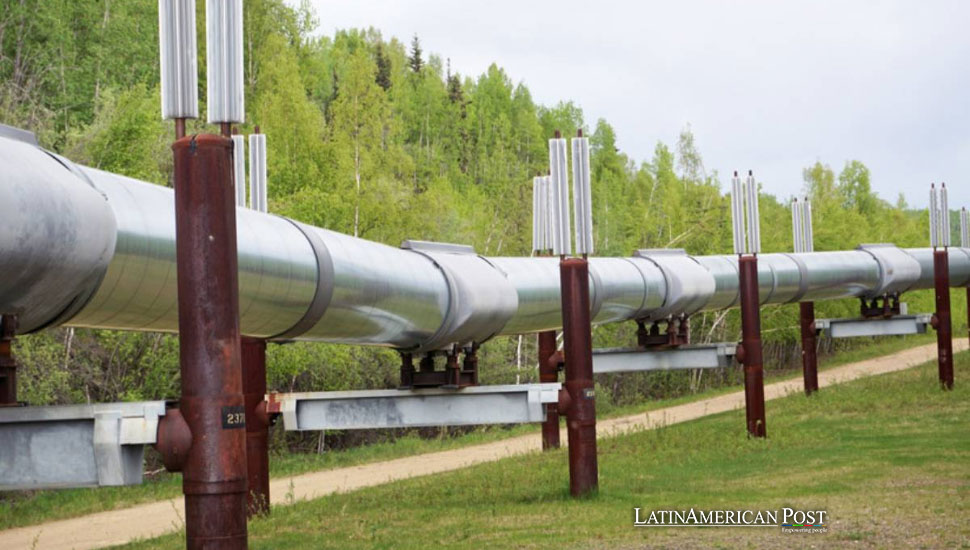Colombia’s Economic Battle to Guard Oil Pipelines Amid Armed Conflict

The Colombian government is ramping up military efforts in Arauca, a department bordering Venezuela, to protect vital oil infrastructure from armed attacks. As these assaults threaten the economy and the environment, the stakes have never been higher.
The Colombian government announced a significant increase in military presence in the Arauca department, a region notorious for its proximity to Venezuela and the violent activities of various armed groups. The decision comes in response to a series of attacks on oil pipelines, particularly the Caño Limón-Coveñas and Bicentenario pipelines, which are crucial to the country’s energy infrastructure.
The Minister of Defense, Iván Velásquez, emphasized the strategic importance of these pipelines and the necessity of enhanced security measures. “What has been decided from the General Command of the Armed Forces is the deployment of additional troops to monitor the pipeline. While it is difficult to maintain control over every meter, patrols will be intensified to reduce these attacks,” Velásquez stated. The government’s move is not merely a defensive strategy but an economic imperative, as the oil sector is a cornerstone of Colombia’s economy.
Economic and Environmental Ramifications
The attacks on the Caño Limón-Coveñas pipeline, which spans 770 kilometers from the oil fields in Arauca to the Caribbean port of Coveñas, have far-reaching consequences. Oil is a critical export for Colombia, and disruptions in its transportation can lead to significant economic losses. Each attack causes immediate damage and halts oil flow, generating millions of dollars in lost revenue.
However, the economic impact is just one side of the coin. The environmental damage caused by these attacks is equally devastating. The crude oil that spills into rivers and streams contaminates water sources, destroys ecosystems, and poses long-term health risks to local communities. The Minister of Defense highlighted this dual threat, stating that these actions “not only attack the country’s economy but also the environment.”
This year alone, the Caño Limón-Coveñas pipeline has been targeted five times, resulting in severe environmental degradation. The oil spills from these attacks have polluted large areas, killing wildlife and making the land unsuitable for agriculture. The environmental cleanup is costly and time-consuming, further straining Colombia’s resources.
The ELN’s Role in Pipeline Attacks
While the Colombian government has not officially attributed these attacks to any specific group, military sources point to the Ejército de Liberación Nacional (ELN) guerrilla as the likely culprit. The ELN, Colombia’s most significant remaining guerrilla group, has a long history of targeting oil infrastructure as part of its insurgency against the state.
General Javier Africano, commander of the Army’s Quirón Task Force, directly accused the ELN of carrying out the recent attacks. The ELN’s resurgence in Arauca comes from a ceasefire agreement that expired on August 3rd. The group had initially agreed to a bilateral ceasefire. Still, it imposed several conditions for its continuation, including being removed from the list of organized armed groups (GAO), the creation of a financial fund to support their activities in exchange for ceasing extortionate kidnappings, and an end to government operations against them.
The breakdown of this ceasefire has led to a violent escalation in Arauca, with the ELN stepping up its activities in the region. The group’s attacks on the pipelines are part of a broader strategy to disrupt the government’s economic interests and maintain leverage in ongoing peace negotiations.
Stalled Peace Negotiations and Future Uncertainties
The current situation in Arauca is emblematic of the broader challenges facing Colombia’s peace process. The government and the ELN have been on-and-off negotiations for years with limited success. The recent escalation in violence following the expiration of the ceasefire underscores the fragility of these talks.
The Colombian government has been skeptical about the ELN’s demands, including establishing a fund to finance their operations and ceasing security force offensives. These conditions have stalled the peace process, leaving the region in a state of uncertainty.
As the government intensifies its military efforts in Arauca, the prospects for a renewed ceasefire or a long-term peace agreement remain unclear. The economic costs of this conflict are significant, with each attack on the oil infrastructure representing a loss of revenue and a blow to Colombia’s international reputation as a stable investment destination.
Moreover, the environmental toll of these attacks is likely to have lasting consequences for the region. The cleanup efforts are expensive and complex, requiring significant resources that could otherwise be used for regional development projects.
The future of Arauca and Colombia’s oil industry hinges on resolving this conflict. The government’s decision to send more troops is a short-term solution to a long-term problem. Without a sustainable peace agreement with the ELN, the cycle of violence and economic disruption is likely to continue.
The situation in Arauca is a stark reminder of the interconnectedness of security, economics, and environmental stewardship. As Colombia navigates these challenges, the need for a comprehensive approach that addresses the root causes of the conflict while protecting the country’s vital economic interests has never been more urgent.
Also read: Petro’s Colombia Economic Gamble and the Uncertainty of Forced Investments
The deployment of additional troops to Arauca is necessary to safeguard Colombia’s oil infrastructure. However, the underlying issues that fuel the conflict, including the ELN’s demands and the stalled peace negotiations, must be addressed to ensure the region’s long-term stability and economic prosperity. The stakes are high, and the costs of inaction are even higher. As the Colombian government continues its efforts to protect the country’s economic lifeline, the world will be watching to see how this complex and volatile situation unfolds.





